Table of contents
Your eCommerce platform shapes how people experience your brand – from how your site looks to how you handle orders, products, and growth. If you’re building something custom, the platform should give you room to design, customize, and scale.
This guide breaks down the strongest options for creative brands. The right choice depends on how hands-on you want to be and how your eCommerce business is set up to grow.
Key takeaways
-
Shopify, Wix, and Squarespace are best for fast setup with design flexibility.
-
WooCommerce and Adobe Commerce offer complete control for advanced custom builds.
-
BigCommerce and Shift4Shop are strong options for growing brands that need enterprise features.
-
Ecwid, Square Online, and Hostinger Website Builder work well for small, creative shops or side projects.
Best eCommerce platforms for launching a custom brand (2026)
We’ve grouped the best options based on what kind of eCommerce business you’re building and how much control you want over the experience.
All-in-one platforms for fast setup
These platforms are designed for speed and simplicity. They include everything you need to launch – hosting, customizable templates, and built-in tools. If you want to get online quickly without sacrificing design, start here.
Shopify
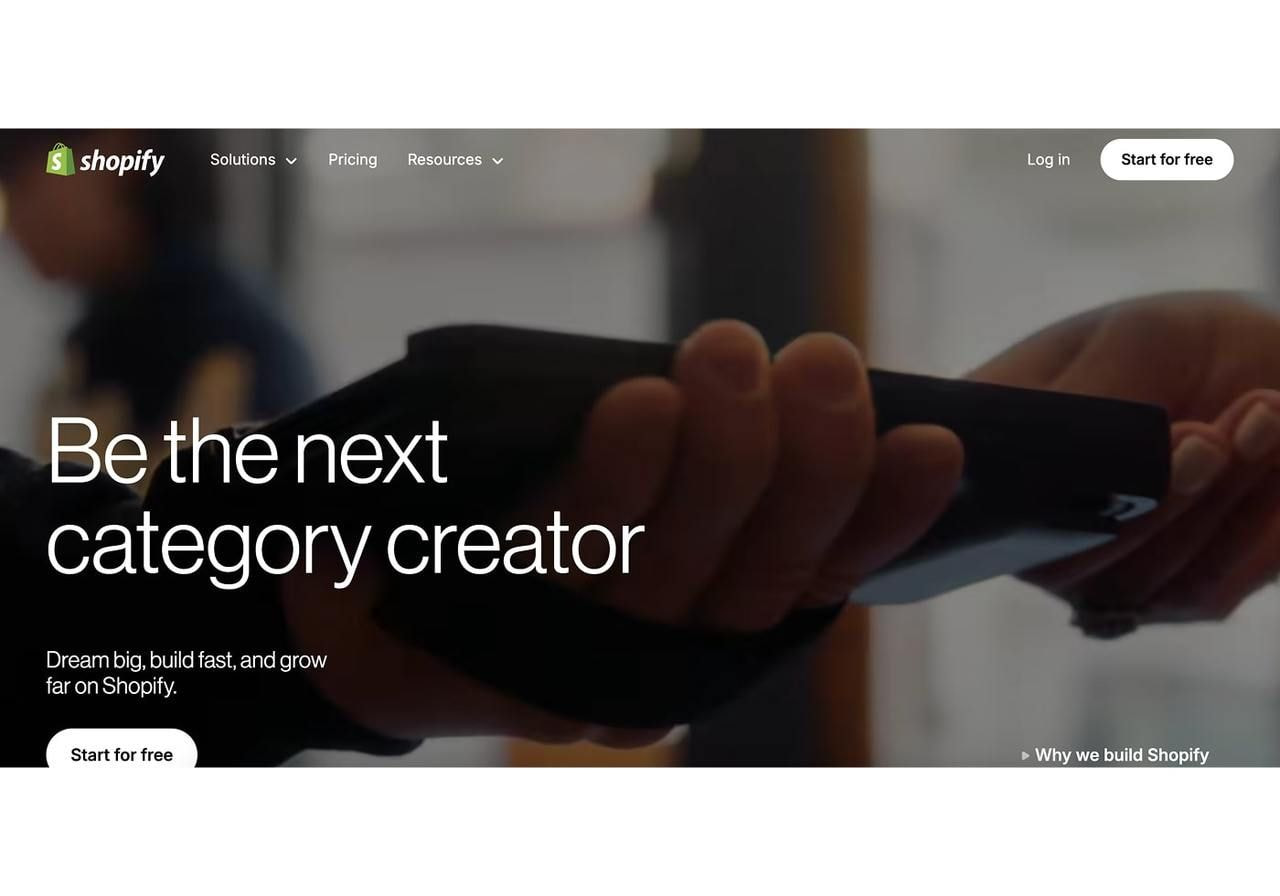
Shopify is one of the most popular eCommerce platforms for a reason. It’s simple to set up, highly customizable with apps and themes, and works whether you’re launching a small shop or scaling a larger brand. You don’t need technical experience to get started, but the eCommerce platform still offers developer tools if you want something more advanced.
Why it works for custom brands
Shopify gives you plenty of control over your:
-
Storefront design
-
Product pages
-
Checkout flow
Start with a template and customize it, or build a unique look using Liquid code.
Print on Demand support
Shopify integrates easily with Printful and other print-on-demand providers, making creating and selling custom products without handling inventory easy.
What to watch for
Some advanced customizations require developer help. Costs can also increase with app usage, especially if you’re scaling fast.
Price
Shopify has four paid plans:
-
Basic: $39/month
-
Grow: $105/month
-
Advanced: $399
-
Plus: $2,300/month
Read more:


Wix
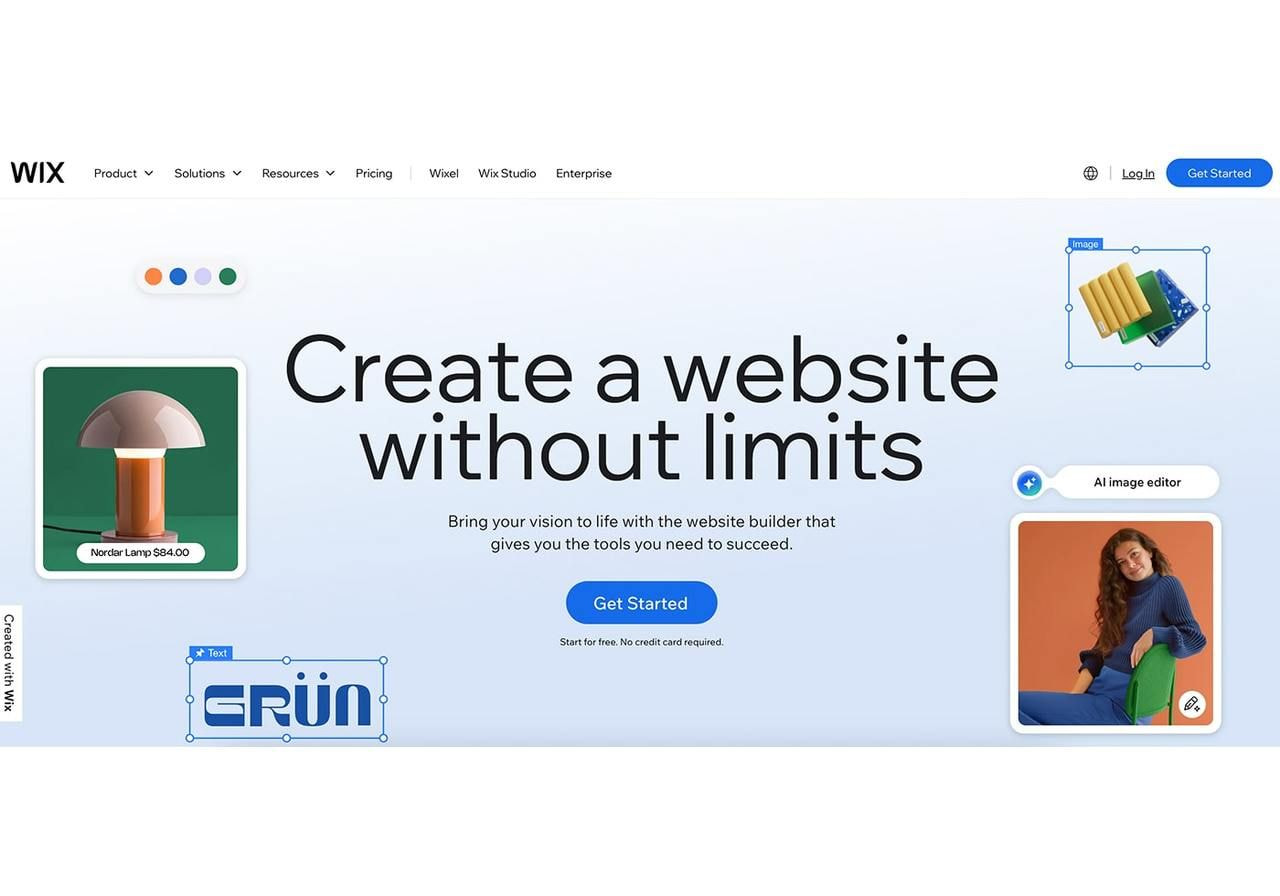
Wix is a strong pick for visual brands that want to get online quickly without writing code. It offers full design freedom using a drag-and-drop editor and includes eCommerce features out of the box.
Why it works for custom brands
Wix gives you tight control over layout and design, so creating an eCommerce store that matches your aesthetic is effortless. It’s especially useful for artists, designers, or product-focused brands that want a polished look without hiring a developer.
Print on Demand support
Wix supports Printful and other POD integrations, though its app marketplace isn’t as deep as Shopify’s.
What to watch for
Performance can dip on heavily customized pages, and scaling is more limited than on bigger platforms.
Price
Wix has three paid plans that support accepting payments:
-
Core: $29/month
-
Business: $36/month
-
Business Elite: $159/month
Read more:
Squarespace
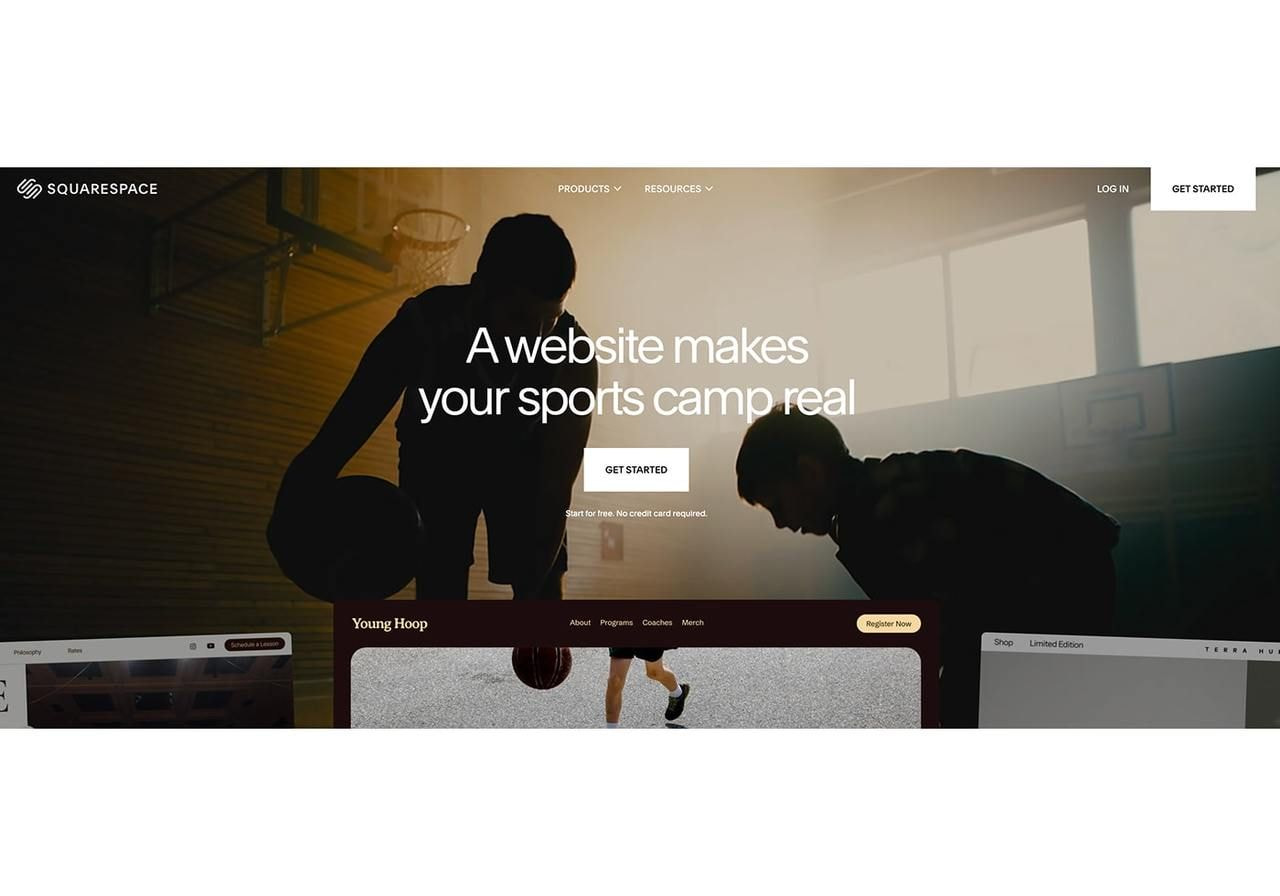
Squarespace is great for brands that want a clean, well-designed eCommerce store with minimal fuss. The eCommerce platform is intuitive and visually appealing, and it works well for businesses with smaller product lines.
Why it works for custom brands
It’s easy to create a cohesive brand experience using built-in design tools. Squarespace themes are sharp and mobile-friendly, with good font and image controls.
Print on Demand support
Connect Printful and a few other print-on-demand tools through extensions, but the options are more limited than on Shopify.
What to watch for
Customization is more rigid. If your store grows beyond a certain size or needs custom features, Squarespace might feel restrictive.
Price
Squarespace offers four eCommerce-enabled plans:
-
Basic: $25/month
-
Core: $36/month
-
Plus: $56/month
-
Advanced: $139/month
Read more: Wix vs. Squarespace: Which website builder is best for you?
Highly customizable platforms
If you’re building a store that doesn’t fit into a template, or you want full control over how everything works, these platforms give you the flexibility to create something from the ground up. They take more time to set up but give you complete ownership over the experience.
WooCommerce
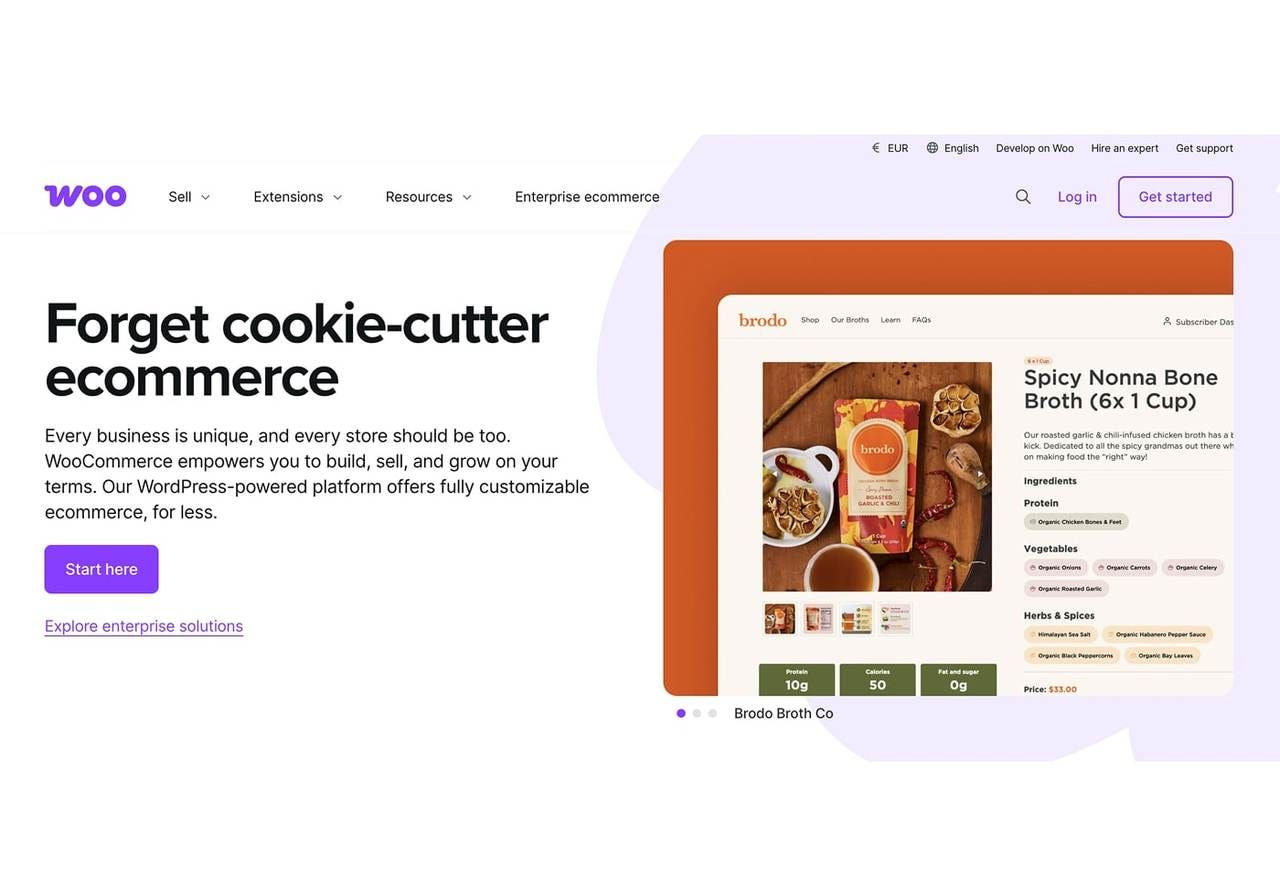
WooCommerce is a free plugin that turns any WordPress site into a full-featured online store. It’s an open-source eCommerce platform, which means you can control nearly every aspect of your site, from layout to checkout flow to backend logic.
Why it works for custom brands
If you already use WordPress or want full control over your site’s design and functionality, WooCommerce allows you to build whatever you need. It’s ideal for brands with unique product types, niche features, or complex site structures.
Print on Demand support
WooCommerce works well with Printful and other print-on-demand plugins, giving you a flexible setup that runs inside your WordPress environment.
What to watch for
Setup and maintenance require more time and technical knowledge. You’ll also need to handle hosting, security, and plugin updates yourself or through a developer.
Price
While WooCommerce itself is free, running a fully functional online store involves various costs:
-
Hosting: ~$20/month
-
Domain name: $15-$200/year
-
Premium themes: $50-$150/year
-
Premium plugins: $200-$500/year for added features
-
Payment gateway fees: ~3% per transaction
-
Website development and maintenance: Optional setup or ongoing help may cost $500-$2,000+
These expenses vary based on your specific requirements and the scale of your own online store.
Read more:
Adobe Commerce (Magento)
-min.jpg)
Adobe Commerce (formerly Magento) is built for large eCommerce operations with complex product catalogs, multi-store setups, or custom backend requirements.
It’s powerful and flexible, but not made for beginners. Since coding knowledge is required, most brands use it with developers or full-service agencies to manage builds and updates.
Why it works for custom brands
Adobe Commerce is ideal for high-volume stores, international brands, and businesses with specialized workflows. You can customize everything from design to data handling, and it supports advanced features like customer segmentation, B2B pricing, and multi-language sites.
Print on Demand support
You can integrate Printful and other print-on-demand tools, though you’ll likely need a developer to set it up correctly within your custom environment.
What to watch for
It’s resource-heavy and expensive to maintain. To keep performance and security in check, you’ll need a solid development team or agency. Unless you require deep customization at scale, it may be more than you need.
Pricing
Adobe Commerce offers paid editions starting around $22,000 for on-premises or $40,000 annually for the Cloud version.
Platforms for scaling businesses
If your brand is growing fast or managing a large product catalog, these platforms are built to keep up. They offer tools for multi-location inventory, advanced search engine optimization (SEO), and integrations that support more complex operations.
BigCommerce
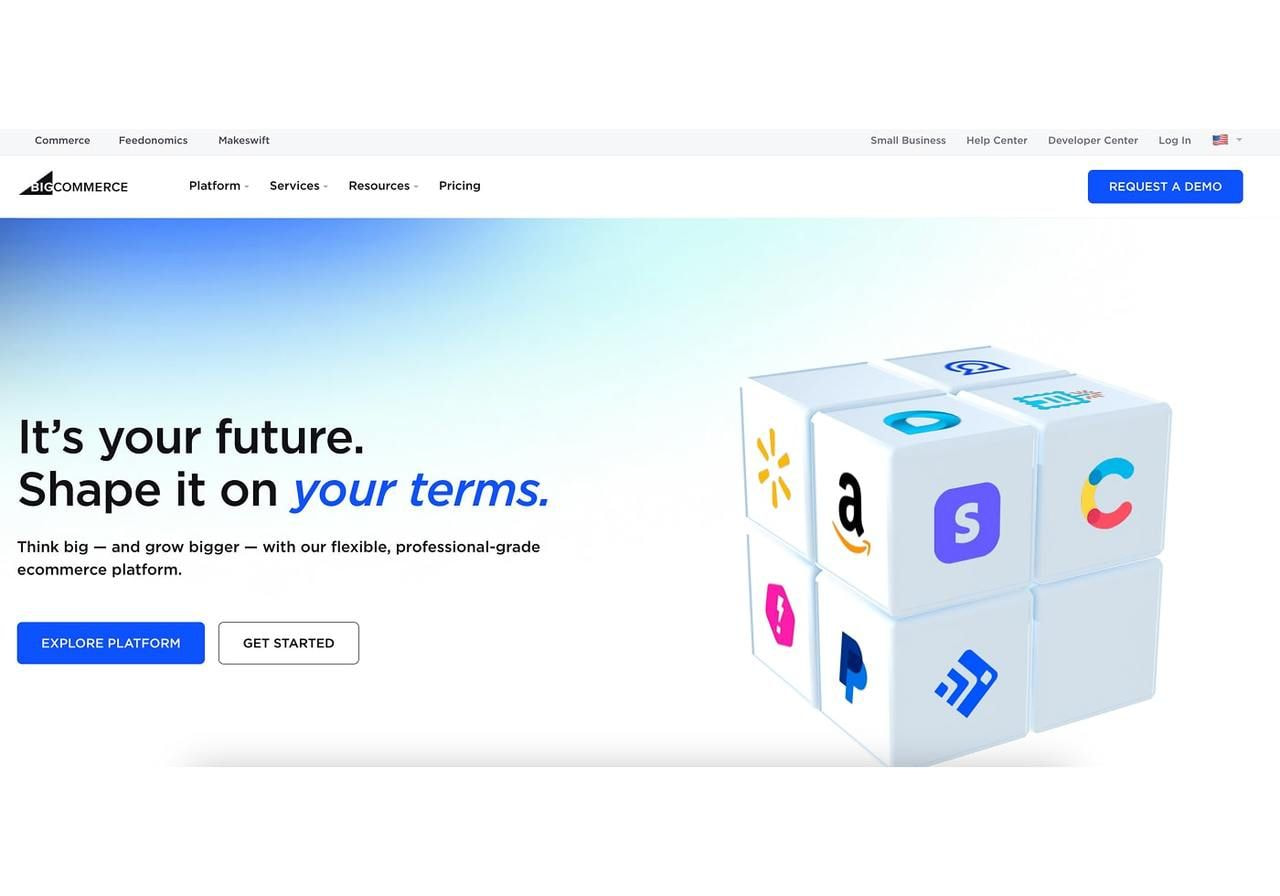
BigCommerce is designed for growth. It’s packed with built-in features that support scaling, including multi-channel selling, headless commerce setups, and strong inventory management. Unlike other platforms, many of these tools come standard instead of through paid add-ons.
Why it works for custom brands
It’s a good fit for brands that have outgrown beginner platforms and need more control without moving into enterprise-level territory. BigCommerce also works well for teams managing multiple storefronts or international customers.
Print on Demand support
You can connect Printful and other providers through the app marketplace. Setup is straightforward, and the backend handles large product catalogs well.
What to watch for
The design tools aren’t as flexible as Shopify or Wix, and you might need developer help for advanced customizations or headless builds.
Price
BigCommerce offers four pricing plans:
-
Standard: $39/month
-
Plus: $105/month
-
Pro: $399/month
-
Enterprise plans with pricing based on online sales.
Note: BigCommerce enforces annual sales thresholds ($50,000 for Standard, $180,000 for Plus, $400,000 for Pro), exceeding caps bump merchants into a higher plan.
Read more: WooCommerce vs. BigCommerce: The ultimate comparison for online sellers
Shift4Shop (formerly 3dcart)
-min.jpg)
Shift4Shop is a lesser-known but surprisingly powerful option for stores that need strong SEO tools, built-in features, and scalability without high monthly costs. It offers a lot right out of the box, including tools for B2B, digital products, and recurring orders.
Why it works for custom brands
Shift4Shop includes many features that other platforms charge extra for. This makes it a solid choice for growing brands that want flexibility without relying heavily on third-party apps.
Print on Demand support
It supports print-on-demand integrations like Printful, though the ecosystem isn’t as large as Shopify’s or BigCommerce’s.
What to watch for
The interface feels dated, and design customization isn’t as intuitive. You may need time or help to get your online store looking exactly how you want it.
Pricing
Shift4Shop offers a free plan if you use Shift4 payment processing (US merchants only). Otherwise, $39/month for other payment gateways.
Niche or emerging platforms
Not every brand needs a full-featured eCommerce suite. These platforms are better for side projects, small catalogs, subscription-based models, or selling custom products online through existing websites. They’re simple, budget-friendly, and often easier to manage.
Ecwid
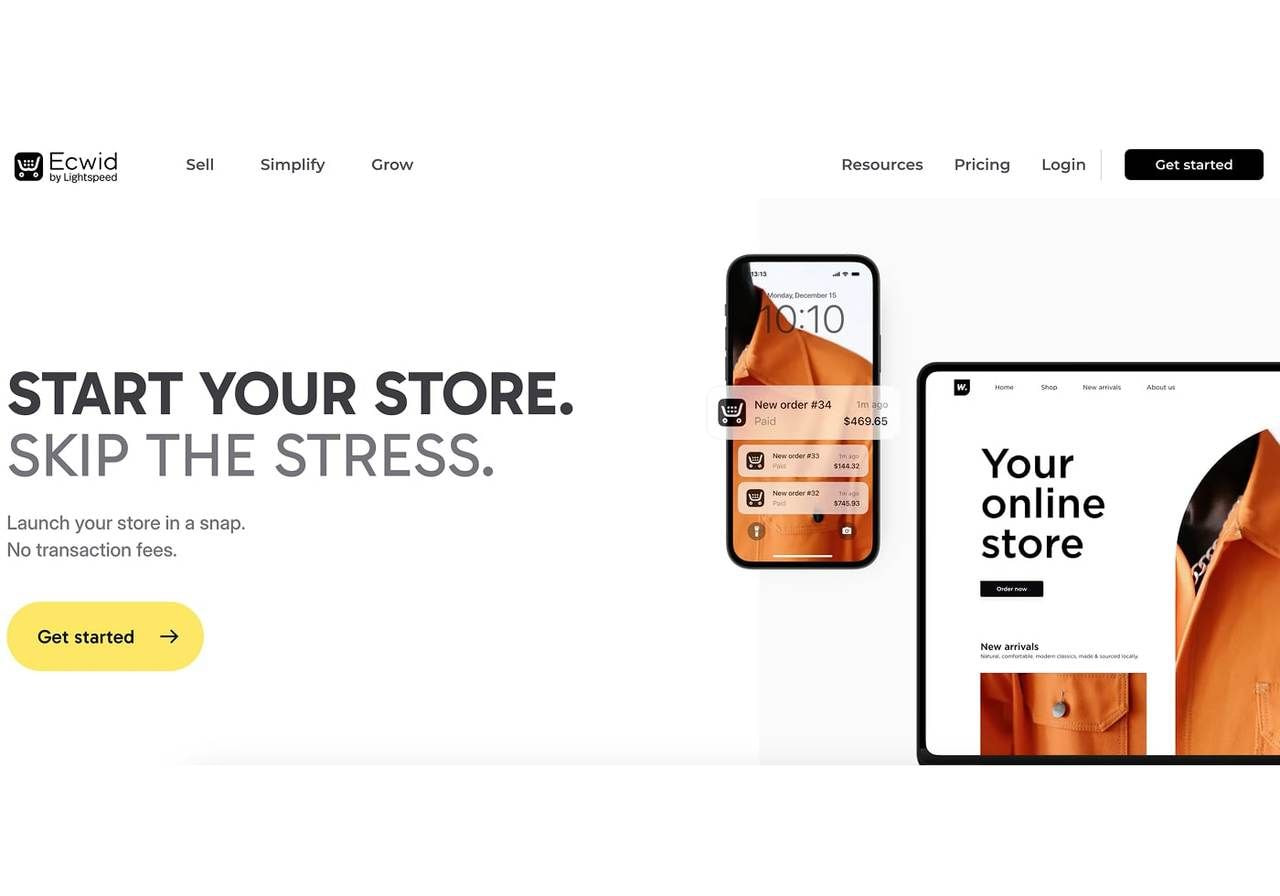
Ecwid is a plug-and-play eCommerce tool that adds selling functionality to any existing eCommerce website. It’s ideal for brands that already have a site and just want to start selling products without migrating or rebuilding their design. You can drop the Ecwid storefront into WordPress, Wix, Squarespace, or custom-coded pages.
Why it works for custom brands
You maintain full control over your website’s look and feel while adding eCommerce exactly where you need it. It’s great for single-product brands, creators with portfolios, or small online stores that don’t need a full eCommerce stack.
Print on Demand support
Ecwid supports Printful and several other print-on-demand services. Integrations are available, but depending on your hosting environment, they sometimes require manual setup or third-party workarounds.
What to watch for
Ecwid is best for light use. It doesn’t scale well for complex catalogs, advanced SEO, or online stores with lots of automation. If you outgrow it, you’ll need to replatform.
Price
Ecwid has four pricing plans:
-
Starter: $5/month
-
Venture: $25/month
-
Business: $45/month
-
Unlimited: $105/month
Square Online
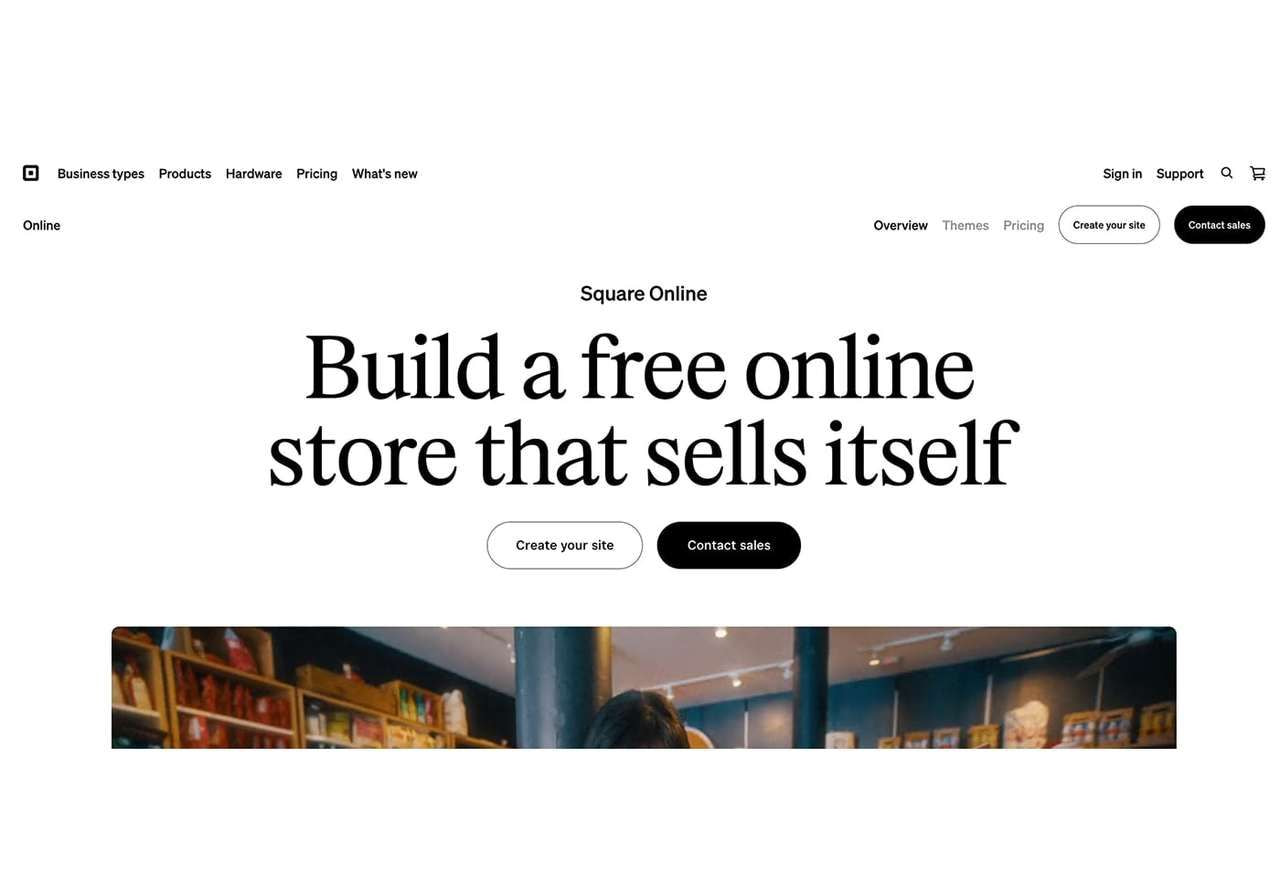
Square Online is a natural extension of Square’s POS system, built for merchants selling in person. It allows you to start selling online with minimal setup while syncing with your in-store inventory and payments.
Why it works for custom brands
If you already use Square at your physical location, Square Online helps you build a consistent brand experience across channels. It’s easy to manage, mobile-friendly, and good for small retail businesses adding eCommerce for the first time.
Print on Demand support
Square Online supports Printful and other POD services through third-party apps, though these integrations are more limited than those of Shopify or WooCommerce.
What to watch for:
Design options are fairly rigid, and the eCommerce platform doesn’t offer deep customization or advanced eCommerce features. It’s great for simplicity, but not ideal for brands that need flexibility or scale.
Price
Square Online offers three pricing plans:
-
Free plan
-
Plus: $29/month
-
Premium: $79/month
Hostinger Website Builder (formerly Zyro)
-min.jpg)
Hostinger has folded Zyro’s user-friendly AI tools into its main Website Builder. Now it’s a single solution for building, hosting, and managing eCommerce, all in one dashboard.
Why it works for custom brands
You get everything bundled: AI-assisted site setup, domain, hosting, SSL, email, and basic eCommerce tools. Great for creative founders who want speed, simplicity, and a polished look without juggling multiple services.
Print on Demand support
Hostinger Website Builder includes native Printful integration, so you can design, list, and sell custom products directly from your online store. The process syncs products and fulfills orders automatically.
What to watch for
Online store customization is limited compared to more advanced platforms. There’s no app marketplace, and the eCommerce features are basic – great for simple stores, less ideal if you need scalability or complex tools.
Price
Hostinger has three pricing plans:
-
Premium: $11.99/month
-
Business: $13.99/month
-
Cloud Startup: $27.99/month
Shopline / Kajabi (depending on region)
These regional or category-specific platforms cater to niche sellers. Shopline is popular in Asia and supports region-specific logistics and payment methods. Kajabi focuses on digital products, coaching, and membership models.
Why they work for custom brands
Each eCommerce platform is built around a unique type of business. Kajabi, for example, is ideal for educational brands or creators selling gated content. Shopline suits businesses operating in APAC markets with local shipping needs and customer behavior.
Print on Demand support
Support varies by platform. Kajabi doesn’t offer native POD tools, and Shopline may require third-party connectors. These platforms aren’t built for Print on Demand first, but workarounds exist.
What to watch for
These platforms tend to be more limited in global support and may not scale well outside their core use case. Before committing, make sure they meet your technical needs and are stable in your region.
Pricing
Shopline has three pricing plans:
-
Starter: $29/month
-
Essential: $79/month
-
Premium: $269/month
Kajabi has four pricing plans:
-
Kickstarter: $89/month
-
Basic plan: $179/month
-
Growth: $249/month
-
Pro: $499/month


How platforms handle SEO and marketing

SEO and marketing go hand in hand. The right eCommerce platform should help your online store appear in search results and connect easily with the tools you use to drive traffic.
Here’s how the major eCommerce platform types compare.
Key takeaways
-
For simplicity and built-in marketing: Shopify and BigCommerce lead.
-
For maximum SEO control: WooCommerce takes the crown – if you’re willing to manage the technical side.
-
For global or enterprise ambitions: Adobe Commerce is unmatched, though resource-heavy.
-
For smaller shops or side projects: Squarespace, Wix, Ecwid, and Hostinger provide enough SEO to get started, with lighter marketing support.
SaaS builders (Shopify, BigCommerce, Wix, Squarespace)
Best for: Brands that want SEO handled out-of-the-box with minimal setup. Shopify and BigCommerce suit growth-oriented stores, while Wix and Squarespace work better for design-driven small catalogs.
Shopify and BigCommerce
-
Both offer strong SEO foundations: Clean URLs, structured data, XML sitemaps, and built-in blogging.
-
Shopify integrates with thousands of apps for advanced schema, multilingual SEO, and redirects. One limitation: you can’t change the “/products/” or “/collections/” URL structure.
-
BigCommerce leans enterprise-ready. It automatically creates 301 redirects when you change URLs, handles large catalogs without slowing down, and supports multi-store SEO.
-
Marketing: Shopify wins on accessible integrations (Facebook, Google Ads, email apps). BigCommerce has fewer apps but more built-in tools for scaling internationally.
Wix and Squarespace
-
Both have improved dramatically. You can now edit meta titles, descriptions, alt text, and sitemaps.
-
Wix adds structured data support (JSON-LD) and advanced SEO settings, but heavy design customizations can slow load times – bad news for rankings.
-
Squarespace generates clean code and sharp, customizable templates, but you’ll hit limits on advanced SEO (robots.txt, redirects).
-
Marketing: Wix and Squarespace include simple email marketing tools and social media integration, but they’re not designed for complex campaigns.
WordPress / WooCommerce
Best for: SEO-driven brands that want full control and don’t mind managing hosting or plugins.
-
WooCommerce gives you total SEO control through plugins like Yoast and Rank Math. You can fine-tune everything – from URL slugs to schema markup.
-
The trade-off: Setup is manual, and performance depends heavily on your hosting and caching. Poor hosting can cause SEO to suffer.
-
With proper setup, WooCommerce can outperform SaaS builders for search visibility, especially if content marketing is central to your brand.
-
Marketing: Flexibility is endless, but nothing is native. You’ll need plugins or third-party tools for email campaigns, analytics, and ad platforms.
Enterprise (Adobe Commerce)
Best for: Global or enterprise brands with the budget for custom SEO and marketing setups.
-
Adobe Commerce is built for large, complex stores. SEO customization is nearly unlimited – multi-language, multi-store catalogs, and custom metadata are all possible.
-
Nothing is turnkey – you’ll need a developer team to configure advanced SEO features and monitor performance.
-
Marketing: Strong B2B key features and integrations with Adobe’s ecosystem (Analytics, Experience Manager), but setup is resource-intensive.
Niche (Shift4Shop, Ecwid, Hostinger Website Builder)
Best for: Side projects, creative shops, or regional sellers who need simple SEO but aren’t aiming for enterprise-level marketing.
Shift4Shop
-
Solid SEO basics: customizable URLs, canonical tags, structured data, and sitemaps are included.
-
Marketing integrations are limited compared to Shopify or BigCommerce.
Ecwid
-
SEO tools are minimal – fine for small catalogs, but less control over structured data or advanced optimizations.
-
On the plus side, Ecwid connects directly to Google Shopping and has social media integration, which helps smaller stores with quick marketing wins.
Hostinger Website Builder
-
Offers essentials like meta editing, sitemaps, and clean URLs.
-
Relies on AI-assisted tools for SEO and content, which may not be robust enough for larger stores.
-
Marketing features are basic – mostly built-in email campaigns and social integrations.
Payments, transaction fees, and checkout experience
|
Platform |
Payment options |
Transaction fees |
Checkout experience |
|
Shopify |
Shopify Payments, Stripe, PayPal, 100+ gateways |
Extra 0.5-2% unless using Shopify Payments; Shopify Payments ~2.9% + $0.30 (US) |
Smooth, mobile-friendly checkout with Shop Pay, Apple Pay, Google Pay; advanced customization requires Plus |
|
Wix |
Stripe, PayPal, Apple Pay, Wix Payments (regional) |
Standard gateway fees (~2.9% + $0.30 US) |
Simple checkout; limited customization; product cap of 50,000 SKUs |
|
Squarespace |
Stripe, PayPal, Apple Pay |
No fees on Commerce plans; 3% fee on Business plan + gateway fees (~2.9% + $0.30 US) |
Clean, minimal checkout; fewer customization options |
|
WooCommerce |
Stripe, PayPal, Authorize.Net, regional gateways |
No platform fee; gateways ~2-3% |
Highly customizable checkout via plugins; manual setup required |
|
Adobe Commerce (Magento) |
Stripe, PayPal, Braintree, custom enterprise gateways |
No platform fees; depends on provider contracts |
Fully customizable checkout; requires coding knowledge |
|
BigCommerce |
PayPal, Stripe, Square, 65+ gateways |
No platform fees; standard gateway charges |
Optimized one-page checkout; customization available for enterprise |
|
Shift4Shop |
Shift4 Payments (US) + other gateways |
Free with Shift4; $39/month if using non-Shift4 gateways + gateway fees |
Supports multiple payment options; flexible but dated interface |
|
Ecwid |
Stripe, PayPal, Square, Apple Pay |
Standard gateway fees (~2.9% + $0.30 US) |
Checkout embedded into your existing site; straightforward but basic |
|
Square Online |
Square Payments (native); PayPal in select regions |
2.9% + $0.30 online (US); 2.6% + $0.15 in-person |
Seamless checkout tied to Square POS; ideal for online + offline sales |
|
Hostinger Website Builder |
Stripe, PayPal, local methods |
No platform fees; standard gateway rates (~2.9% + $0.30) |
Simple, beginner-friendly checkout; limited customization |
|
Shopline / Kajabi |
Shopline: Regional options (Alipay, WeChat Pay, GrabPay) |
Varies by region/provider; Kajabi uses standard Stripe/PayPal fees |
Shopline: Localized, flexible checkout |
Choosing the right eCommerce platform for your brand
Different platforms work better depending on what you sell and how you run your business. Use the list below to match your needs to the right type of platform.
Top picks by product type:
-
Print on Demand: Shopify, Ecwid, Wix
-
Digital products or courses: Kajabi, WooCommerce
-
Subscriptions or memberships: Shopify (with Recharge), Kajabi
-
Physical goods (retail or wholesale): Square Online, Shift4Shop, BigCommerce
Top picks by goal:
-
Fast launch: Wix, Shopify
-
Total control: WooCommerce, Adobe Commerce
-
Budget-friendly: Square Online, Hostinger Website Builder, Ecwid
-
Multi-channel sales: BigCommerce, Shopify
-
In-person and online: Square Online, Shopify POS
Support and community for online business owners
Customer support and peer resources can make or break your experience with an eCommerce platform. Here’s how each eCommerce platform stacks up.
Shopify
-
Support: 24/7 live chat, email, and phone support (though phone is being phased out in some regions). Plus, merchants get priority response times.
-
Community: Massive global developer and app ecosystem, with official forums, tutorials, and the Shopify Academy/Compass learning resources.
Wix
-
Support: Email and live chat. Higher-tier plans include priority response times.
-
Community: Good help docs, community forum, and a growing Wix Partner Program for agencies and developers. Smaller base compared to Shopify or WooCommerce.
Squarespace
-
Support: 24/7 email support and live chat Monday-Friday, 4 am-8 pm EST.
-
Community: Beginner-friendly with an official forum, webinars, and workshops, but a smaller peer-to-peer ecosystem than open-source platforms.
WooCommerce
-
Support: Community-driven (forums, docs, tutorials). Paid ticket support available for official extensions. Managed hosting providers may bundle in 24/7 help.
-
Community: Huge open-source developer base thanks to both WooCommerce and the wider WordPress ecosystem. One of the largest communities online, though help quality varies.
Adobe Commerce (Magento)
-
Support: Enterprise-level help through Adobe SLAs or agency partners. Cloud customers receive formal support contracts.
-
Community: Extensive and highly technical developer community, plus Adobe’s developer docs and forums. Best suited for enterprises with developer resources.
BigCommerce
-
Support: 24/7 support across all plans. Enterprise customers get dedicated account managers.
-
Community: Strong knowledge base, active forums, and a Partner Directory connecting merchants with agencies and developers. Smaller than WooCommerce’s, but very reliable.
Shift4Shop
-
Support: Phone, chat, and email support available.
-
Community: Historically active forums, but community activity has declined. Fewer tutorials and resources compared to larger platforms.
Ecwid
-
Support: Email and live chat, with priority support for higher-tier plans. Free plan users only get the Help Center.
-
Community: Small but active user group, with an official Facebook community (~20,000 members). Better for small sellers than advanced eCommerce brands.
Square Online
-
Support: Phone and chat support, especially strong for merchants already using Square POS. Support hours are Monday-Friday, 6 am-6 pm PST.
-
Community: Active Square Seller Community forum, though most resources focus on Square’s ecosystem rather than broader eCommerce.
Hostinger Website Builder (formerly Zyro)
-
Support: 24/7 live chat.
-
Community: Responsive support team and a solid knowledge base with tutorials, but limited peer-to-peer forums or third-party resources compared to Shopify or WordPress.
Shopline / Kajabi
-
Shopline: Regional support teams, particularly strong in APAC markets. Higher-tier plans often include dedicated account managers. Smaller global community overall.
-
Kajabi: 24/7 chat and email support, an extensive knowledge base, live workshops, and a very active Kajabi Hero Facebook group (35,000 members) geared toward digital creators.
eCommerce platform comparison table
|
Platform |
Ease of use (setup and daily) |
Customization (design and functionality) |
Scalability (growth potential) |
Integrations (marketing, payments, inventory) |
|
Shopify |
Very intuitive setup, easy daily use |
Broad control via themes and Liquid, with developer access |
Scales from small to enterprise stores successfully |
Vast app marketplace, excellent multichannel and POD support |
|
Wix |
Drag-and-drop simplicity, beginner-friendly |
Strong design control within the limits of the visual editor |
Best for small to mid-sized catalogs |
Limited app ecosystem, fewer integrations than Shopify |
|
Squarespace |
Clean and minimal setup |
Beautiful themes, limited flexibility |
Good for small stores |
Limited integrations, fewer built-in eCommerce tools |
|
WooCommerce |
Moderate setup if familiar with WordPress |
Full control if comfortable with code or plugins |
Scalable, but depends on hosting and maintenance |
Extensive plugins and POD tools |
|
Adobe Commerce |
Complex setup requires developer support |
Near-total control but steep development curve |
Best for high-volume, global, multi-store brands |
Deep integrations, custom development required |
|
BigCommerce |
Manageable setup, more features out of the box |
Decent flexibility, headless-friendly |
Strong enterprise and international use case |
Solid native capabilities; Printful via app marketplace |
|
Shift4Shop |
Moderate setup; built-in website builder available |
Many built-in tools; UI occasionally dated |
Scales well with enterprise plans |
Strong built-in features for SEO, payments, and multichannel |
|
Ecwid |
Very easy to integrate into existing sites |
Simple embedded widget only |
Good for one-off or minimal catalogs |
Basic integrations; manual POD setup possible |
|
Square Online |
Seamless if already on Square POS |
Limited design flexibility |
Solid for small online/offline businesses |
Excellent Square ecosystem, Printful supported |
|
Hostinger Website Builder |
Extremely easy setup, drag-and-drop interface |
Good for simple stores; AI tools aid setup |
Suited for starters and small shops |
Basic integrations; AI tools help accelerate setup |
|
Shopline / Kajabi |
Variable by platform |
Tailored to niche (e.g., digital courses on Kajabi) |
Scalable within niche markets |
Varies widely; POD often not native |
Each eCommerce platform has trade-offs. Some are easier to set up but harder to customize. Others offer more control but take longer to learn.
The right choice depends on how your business runs, how comfortable you are with tech, and how much you plan to grow.
Key considerations when choosing a platform
The best eCommerce platform fits how your business runs today and where you want it to go.
-
Ease of use – How fast you can launch and manage your online store.
-
Customization – The level of control over design, layout, and features.
-
Scalability – How well it supports growth in products, traffic, and sales.
-
Integrations – Compatibility with your tools for payments, shipping, and marketing.
Pick a platform that matches your technical comfort and brand goals, not just what’s popular.
Conclusion
There’s no one-size-fits-all eCommerce platform. What works for a large brand with complex needs won’t suit a small creative shop launching its first product.
If you want full control, WooCommerce or Adobe Commerce are strong bets. If you want speed and ease, Shopify or Wix make things simple. And if you’re running a niche setup or just testing ideas, tools like Square Online or Ecwid might be all you need.
Focus on what matters most to your business right now, and choose the eCommerce platform that best meets that need.
FAQs
Shopify is the best choice for beginners. It’s easy to set up, has a clean interface, and comes with built-in tools for payments, shipping, inventory management, and eCommerce capabilities. You can launch an online store in a day without any coding.
WooCommerce and Adobe Commerce offer the most flexibility. Both give you full control over layout, features, and backend logic. WooCommerce is better for WordPress users, while Adobe Commerce suits enterprise-level brands with developer support.
For most new brands, Shopify or Wix are the best places to start. They’re fast to launch, easy to manage, and support Print on Demand and other key tools.
Start with a solid foundation. Here’s a simple step-by-step:
-
Choose a platform that fits your budget and goals
-
Set up your online store and design your layout
-
Add your products and write clear descriptions
-
Connect payments, shipping, and taxes
-
Test everything before going live
-
Promote your online store and start building your audience
It depends on how you sell:
-
Square Online – Great if you sell in person and want to sync inventory.
-
Shopify – Ideal for small businesses planning to scale.
-
Wix or Squarespace – Best for visual brands with small catalogs.
All of these are easy to manage and budget-friendly.

Karlina is an SEO Content Writer specialist at Printful. As a firm believer in attitude over aptitude, Karlina gives her 100% whenever she works on something new. Karlina spends her free time reading, traveling, and doing yoga.





